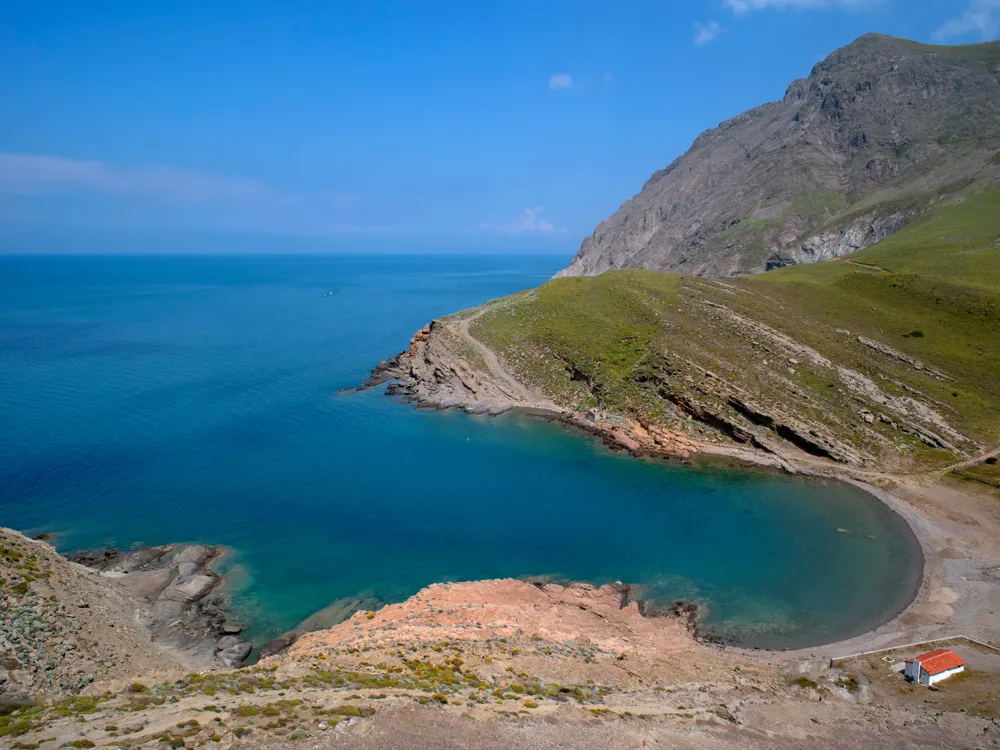What is the best time to visit Turkey?
Turkey, a captivating blend of cultural richness and natural beauty, beckons travellers year-round. Understanding the optimal time to visit is key to experiencing the country at its finest. Let's explore the nuances of Turkey's weather and its impact on your travel experience.
The best time to travel to Turkey may depend on your interests. With relatively moderate temperatures ranging from 68°F to 86°F, April, May, September, and October are often the finest months to explore Turkey's vast array of historic monuments.
The south coast experiences mid-thirties temperatures throughout the scorching summer months of June through September. While viewing the attractions might be fairly uncomfortable, this is ideal for relaxing by the pool or the sea.
As late October approaches, the temperature starts to drop. It may be rather chilly from November to March, and many hotels along the shore close during this time.Though it's cold outside, these winter months might be the most ideal for touring the sights because they're far less crowded. Although it might be -32°F in Cappadocia, the beautiful snowy scenery is worth seeing.
More about the Best Time to Travel to Turkey
Turkey's diverse climate offers unique experiences during different seasons. Whether you crave the warmth of the sun or the allure of winter landscapes, there's a season for every traveller.Turkey tour seasons are generally best in the spring and autumn. The temps are pleasant, and there's plenty to see in the flowering nature from early April until late May.
Similarly, September and October are ideal for touring since the summer heat persists and there are fewer people at the main locations. Turkey travels are best taken in the summer, especially to see the attractions of the Mediterranean and Aegean coasts, such as Kusadasi and Fethiye.
The nation experiences rain and snowfall when the temperature cools off in the winter. The Aegean coast's ancient sites are best enjoyed during this season, when Cappadocia provides the ideal vistas for taking pictures.
Travel Peak Season in Turkey
The peak season in Turkey, from March to October, showcases the country's splendour. Mild temperatures, blooming landscapes, and vibrant festivals make this period ideal for exploring historical sites and enjoying outdoor activities.
-
Late Spring to Early Autumn (May to September):
- This period is considered the high season for tourism in Turkey.
- May to September are characterised by warm and dry weather, making them ideal for outdoor activities and sightseeing.
-
Key Features:
- The Mediterranean and Aegean coastal areas, including popular destinations like Antalya, Bodrum, and Izmir, experience a surge in visitors seeking beach vacations.
- Historical and cultural sites, such as Istanbul, Ephesus, and Cappadocia, attract tourists interested in exploring Turkey's rich heritage.
-
Festivals and Events:
- Various festivals and events take place during the peak season, showcasing Turkish arts, music, and culture.
- The Istanbul Music Festival, held in June, and the International Istanbul Film Festival are among the notable events.
-
Cruise Season:
- The Mediterranean and Aegean coasts are popular cruise destinations during the peak season, with cruise ships stopping at ports like Kusadasi and Istanbul.
-
Ideal for outdoor activities:
- Travellers can enjoy outdoor activities such as hot air balloon rides in Cappadocia, hiking in the mountains, and water sports along the coast.
-
Historical and Cultural Exploration:
- The warm weather makes it comfortable for exploring historical sites, ancient ruins, and vibrant markets in cities like Istanbul and Ephesus.
Travel Offseason in Turkey
For those seeking a quieter experience, the offseason from November to February provides a serene atmosphere. While some attractions may have reduced hours, the charm of winter landscapes and fewer crowds make it a delightful time to visit.
-
November to March (Winter Season):
- This period is considered the off-season for tourism in Turkey.
- Winter in Turkey is characterised by cooler temperatures, especially in the inland and eastern regions.
-
Reduced tourist crowds:
- During the offseason, tourist destinations and historical sites experience fewer visitors, providing a more intimate and relaxed experience.
- Popular sites like Istanbul's Hagia Sophia and Topkapi Palace are less crowded.
-
Winter Sports in Mountainous Regions:
- Some regions, particularly in the mountainous areas of central and eastern Turkey, offer opportunities for winter sports such as skiing and snowboarding.
- Ski resorts in places like Uludağ, Erciyes, and Palandöken attract winter sports enthusiasts.
-
Budget-Friendly Travel:
- Accommodation prices, tour packages, and flights may be more budget-friendly during the offseason, offering cost-saving opportunities for travellers.
-
Cultural and Urban Exploration:
- Winter is an excellent time for cultural exploration, including visits to museums, art galleries, and historical sites.
- Cities like Istanbul and Ankara offer a vibrant cultural scene, indoor attractions, and culinary experiences.
-
Cappadocia Winter Magic:
- Cappadocia is particularly enchanting during the winter, with its unique landscapes covered in snow and fewer crowds.
- Hot-air balloon rides are still possible, providing a different perspective on the region.
Turkey Weather in Winter (November – February)
Venturing into the winter months, Turkey transforms into a magical wonderland. From November to February, the country experiences cooler temperatures and occasional snowfall, creating a unique and enchanting atmosphere.
Turkey Weather in November
November marks the onset of winter, with temperatures ranging from 8 to 18°C. While coastal areas remain mild, inland regions witness cooler temperatures, making it a perfect time for cultural exploration.
Turkey Weather in December
As December unfolds, Turkey embraces winter with average temperatures between 5 and 15°C. Festive decorations adorn the cities, and snow-covered landscapes add a picturesque touch to your Turkish experience.
Turkey Weather in January
January brings colder temperatures, ranging from 3 to 12°C. It's an excellent time for those seeking a peaceful retreat, with the chance to witness Turkey's historical sites adorned with a dusting of snow.
Turkey Weather in February
February sees a gradual transition towards spring, with temperatures rising from 5 to 14°C. It's an opportune time for budget travellers, as accommodation prices tend to be lower than during the peak season.
Turkey Weather in Summer (March to June)
As spring unfolds, Turkey bursts into colour, heralding the arrival of warmer temperatures. From March to June, the country experiences a pleasant climate, making it an ideal time for outdoor activities and coastal explorations.
Turkey Weather in March
March offers a delightful mix of spring blooms and mild temperatures, ranging from 7 to 16°C. It's an excellent time for nature lovers, with landscapes coming alive after the winter slumber.
Turkey Weather in April
April brings warmer weather, with temperatures between 10 and 20°C. It's an optimal time for exploring both historical sites and natural wonders, with longer daylight hours enhancing your travel experience.
Turkey Weather in May
May marks the onset of summer, with temperatures ranging from 14 to 25°C. The pleasant weather invites travellers to indulge in outdoor activities and beach retreats along Turkey's stunning coastlines.
Turkey Weather in June
June heralds the beginning of summer, with temperatures between 18 and 29°C. It's an ideal time for beach enthusiasts, as coastal regions come alive with a vibrant energy, offering a perfect blend of relaxation and adventure.
Turkey Weather in Monsoon (July – October)
While Turkey doesn't experience a typical monsoon season, the period from July to October sees a slight increase in rainfall. Despite this, the warm temperatures and diverse landscapes continue to attract visitors.
Turkey Weather in July
July brings warm temperatures, ranging from 21 to 33°C. While there might be occasional showers, it's a great time to explore Turkey's natural beauty, from cascading waterfalls to lush green landscapes.
Turkey Weather in August
August continues the warm trend, with temperatures between 22 and 34°C. The slight increase in rainfall adds a refreshing touch to the landscape, making it an excellent time for nature enthusiasts.
Turkey Weather in September
September offers pleasant weather, with temperatures ranging from 18 to 30°C. It's an ideal month for cultural exploration and outdoor activities, with the added advantage of fewer crowds.
Turkey Weather in October
October marks the end of the tourist season, with temperatures between 14 and 24°C. The landscapes transform into a tapestry of autumn colours, providing a unique and tranquil experience for those who choose to visit during this time.
Conclusion
Choosing the best time to visit Turkey depends on your preferences and the experiences you seek. Whether you're drawn to the vibrant energy of summer, the enchanting winter landscapes, or the tranquilly of the offseason, Turkey welcomes you with its diverse and captivating offerings.
What is the best time to visit Turkey?
The best time to visit Turkey depends on your preferences. The peak season from March to October is ideal for mild weather and vibrant festivals, while the offseason from November to February offers a quieter experience with winter charm.
What is Turkey's weather like in winter?
Winter in Turkey (November to February) brings cooler temperatures and occasional snowfall. It transforms the country into a magical wonderland, perfect for those seeking a unique and enchanting experience.
Is summer a good time to visit Turkey?
Yes, summer (March to June) is an excellent time for outdoor activities and coastal explorations. The pleasant climate and vibrant energy make it ideal for beach enthusiasts.
Does Turkey experience a monsoon season?
While Turkey doesn't have a typical monsoon season, the period from July to October sees a slight increase in rainfall. However, warm temperatures and diverse landscapes continue to attract visitors.
What are the temperatures like in July in Turkey?
July in Turkey brings warm temperatures, ranging from 21 to 33°C. Despite occasional showers, it's a great time for exploring the country's natural beauty.




jpg.webp)


















